Vol. 4 No. 15 TROPIC LIGHTNING NEWS April 14, 1969
Index
Cav, RVN Marines Spar With VC,
Nine-Hour Battle Kills 42 Enemy
By SP4 Robinson Truitt
CU CHI - In nine hours of sharp fighting with an estimated Viet
Cong company four miles north of Go Dau Ha, the 3d Squadron, 4th Cavalry
supporting RVN Marines accounted for 42 enemy dead.
Moving across dry rice paddies and occasional hedgerows C Troop
came to the aid of the RVN Marines around noon. They faced a small wooded area with
thick underbrush from which the RVN troops had been receiving heavy small arms
fire during the morning.
Advancing the wood line, the troopers encountered intense
machinegun fire and rocket-propelled grenades.
“The VC were concealed in bunkers and spider holes,” explained
Private First Class Terry Bradley of East Otto, N.Y. “The RPG’s were
coming thick and fast, but many were hitting trees. Charlie just popped up
out of holes, fired off a round blindly, and dropped down in again.”
In some cases, the tanks and tracks were no more than 40 feet from
the enemy’s bunkers when he opened up. The Horsemen backed out and called in artillery and air
strikes. When supporting fire was concluded, they went in again and still
met stiff enemy resistance. They pulled back and called in more air
strikes.
Four times they went in, firing all their weapons against
pinpointed targets.
Responding to C Troop’s call for assistance, first B Troop and
then A Troop arrived at the scene of contact.
Moving off the main supply route on their way to the embattled
area, A Troop found un-detonated RPG rounds all along the path, left there when
the enemy hastily retreated to stronger defensive positions in the face of C
Troop’s advance.
After positioning themselves on line, the three troops once more
assaulted the enemy’s defenses. They punched through the first line of
bunkers and spider holes and poured their devastating fire into the remaining
bunkers.
But by this time, many VC had evacuated their holes and were
creeping around to the side and behind the troopers. Some tracks began
drawing fire from the rear.
Around 9:30 p.m., the strength of the enemy’s resistance was
broken. When the Horsemen regrouped into their night laager position, more
air strikes were called in.
All during the night flares lit up the area and the troopers
remained alerted to any signs of enemy activity. But next morning ,when
they returned to the wood line again, they met no resistance. The enemy
had retreated during the night.
 |
MECHANIZED INFANTRYMEN from the First Brigade move on line to drive a large NVA force from their hedgerow fortress north of Cu Chi. (PHOTO BY SP5 DOUG ELLIOT) |
Regulars Romp On Campsite
TAY NINH - Working the jungles on the outer edges of War Zone C,
Regulars of the 3d Battalion, 22d Infantry surprised and overran an NVA base
camp. Nineteen enemy were killed in the ensuing four-hour battle that was
supported by artillery, helicopter gunships and tactical airstrikes.
Bravo Company was dropped into the area six and one half miles
north of Tay Ninh to search an enemy base camp that had been empty the last time
they checked it.
“But this time the ‘no vacancy’ sign was out,” said
Specialist 4 Ken Persoon of Tyler, Minn. “We figured it wasn’t empty
any more because we spotted several new bunkers and some fresh deer meat hanging
from a tree branch. Our point man approached the bunker complex very
cautiously.
“As he reached the first bunker, two NVA popped up out of the
hole and stretched their arms as if they had just woke up. Our point man
yelled for them to ‘chieu hoi’ but they decided to reach for their weapons
instead. The point man killed them both.”
The first shots woke up the rest of the sleeping enemy force and a
fierce fire fight erupted. Alpha Company moved up from the rear to lock
the enemy into their own base camp.
There were many acts of heroism.
Bravo’s second platoon leader, First Lieutenant Gary Schirado of Richland,
Wash. charged an enemy bunker to toss a hand grenade into it. His quick
action stopped the enemy machinegun which was firing on his men.
Rocket-spewing Cobra ships from the ‘Rat Pack’ gunship platoon
of the 187th Assault Helicopter Company and 3d Battalion, 17th Aviation assisted
the Regulars. Heavy artillery pounded the entrenched enemy between the
gunship runs. Later, air strikes were called in to eliminate heavy enemy
concentrations.
“The complex was large enough to accommodate a regiment, but
I’m sure the force occupying the bunkers was less than that,” said
Specialist 4 Ken Turner of Jamestown, Tenn. “They used small arms and
automatic weapons but strangely, no RPG.”
Warrior Demo Crews Blast Enemy’s Home to Oblivion
CU CHI -As Tropic Lightning troops of the 2d Battalion, 12th
Infantry find and engage the enemy in the scorching paddies and hedgerows of the
Trang Bang area five miles northwest of Cu Chi, they repeatedly find themselves
in temporary possession of bunker and tunnel complexes which the enemy has
hastily abandoned.
To assure that he will never return to his lair, the demolition
engineers with the Warrior Battalion must work swiftly and with skill to destroy
Charlie’s underground handiwork.
On an operation eight miles north of Cu Chi, Alpha Company Warriors
routed an estimated reinforced enemy platoon from a dense maze of bamboo.
Driving into the enemy camp behind a fierce barrage of small arms the Tropic
Lightning troopers killed 18 of the VC and NVA soldiers and took complete
control of their entrenched fighting positions and bunkers.
Swiftly locating the six major fortifications in the camp, the
demolition men put in a call for heavy explosives. Within minutes a Huey
slick was enroute with a load of 15 pound shape charges.
With just a short half-hour left before an eagle flight was to lift
the weary company out of the area, the engineers had to accomplish the
monumental task of destroying the six huge bunkers and a number of smaller
fortifications. A demo team set to work.
Directing the distribution of the heavy charges to strategic
locations, the 65th Engineer Battalion experts started at the far end of the
complex. Working leap-frog fashion, meeting only to exchange tools and cut
carefully measured lengths of fuse from a roll of orange cord, the team set
quickly to work.
Expertly crimping delicate, high explosive blasting caps to the
time fuse and inserting them into a small hole in the end of the cone-shaped
charges, the team used hand signals to indicate when a charge was ready to be
ignited.
After he ignited the first fuse, one of the team members rose and
raced to the location of the second charge, where his comrade was already
preparing to light the fuse.
“Three minutes,” he called as he passed enroute to number three
where 30 pounds of explosives were waiting. He dropped to his knees and
worked quickly.
Behind him now were two lighted fuses. His comrade passed him
heading for number four. Just as the third fuse was ignited, the first
thundering explosion shook the countryside.
“All charges had to be blown before the choppers landed,” said
65th Engineer Battalion First Lieutenant Lovell Nester of St Joseph, Mo. “Working this ‘leap-frog’ method is not standard procedure but the men on
the scene were competent, well-trained soldiers and they made the decisions
based on time available and the job to be done.”
Just before the eagle flight roared in over a distant tree line,
the two engineers turned and looked back.
Two hundred meters away the ground erupted. A plume of smoke
and debris burst silently a hundred feet into the air. A second later the sound
came.
Turning back toward the landing zone the team signaled, “Last
charge. All clear “ to Alpha Company commander First Lieutenant Richard N.
Wiggins of St. Petersburg, Fla.
The choppers were on their way.
| Every soldier in the Tropic Lightning has what is known as common sense. We have to use it each day in order to perform our mission. Safety is often said to be the application of common sense. The large number of accidents that happen to people over here proves that common sense is not common enough. When was the last time you forgot to use common sense? The consequences could be disastrous. |
Page 2 TROPIC LIGHTNING NEWS April 14, 1969
Decorated
| ARMY COMMENDATION MEDAL (HEROISM) |
|
| CPT Thomas E. Buck,
HHC, 2d Bn, 22d Inf CPT Harry K. Jowers, C Btry, 7th Bn, 11th Arty CPT Donald L. Strong, Co B, 25th Avn Bn CPT Carl Sweatman, HHC, 3d Bn, 22d Inf 1LT Donald P. Caldwell, Co D, 2d Bn, 27th Inf 1LT Dorothle J. Gillespie, Co D, 2d Bn, 14th Inf 1LT Gilbert D. Lilly, Co C, 2d Bn, 22nd Inf 1LT Michael D. Balser, HHC, 3d Bn, 22d Inf 2LT Miles I. Forsyth, Co D, 2d Bn, 27th Inf 2LT Thomas J. Bowes, Co D, 2d Bn, 27th Inf 2LT Martin H. Beach, Co A, 2d Bn, 12th Inf 2LT Craig Bambrough, C Btry, 7th Bn, 11th Arty W02 Miner D. Cobb, HHB, 2d Bn, 77th Arty SFC Hubert H. Barnett, Adv Tm 99 SFC John Ellison, Co B, 3d Bn, 22d Inf SSG George Evans, B Trp, 3d Sqdn, 4th Cav SSG Donald L. Maiberger, Co A, 2d Bn, 22d Inf SSG Robert L. Horan, Co F, 50th Inf (LRP) SSG Ray H. Wallace, Co D, 2d Bn, 12th Inf SSG Forest F. Randolph, Co C, 65th Engr Bn SSG Anthony Ruffin, Co D, 2d Bn, 27th Inf SSG Charles Sweatt, C Btry, 7th Bn, 11th Arty SSG Bernard T. Hayward, B Btry, 7th Bn, 11th Arty SSG Adam M. Flores, B Btry, 7th Bn, 11th Arty SSG Michael Carey, C Btry, 7th Bn, 11th Arty SGT Gerald Vankirk, HHC, 3d Bn, 22d Inf SGT Jack C. Wurm, Co C, 1st Bn, 5th Inf SGT Guillermo L. Castillo, Jr., Co D, 2d Bn, 27th Inf SGT Ralph D. Allen, HHC, 2d Bn, 14th Inf SGT Richard L. Wade, Co A, 2d Bn, 22d Inf SGT Robert E. Clark, Co D, 3d Bn, 22d Inf SGT James E. Wallace, Co D, 2d Bn, 27th Inf SGT John S. Chattam, Co D, 2d Bn, 27th Inf SGT Loyd E. Lightfoot, C Btry, 1st Bn, 8th Arty SGT Kurtis M. Boyter, HHC, 3d Bn, 22d Inf SGT Mathine Resendez, C Btry, 1st Bn, 8th Arty SGT James Belmudez, C Btry, 7th Bn, 11th Arty SGT Larry D. Fetters, B Btry, 7th Bn, 11th Arty SGT Charles R. Collins, B Btry, 7th Bn, 11th Arty SGT George L. Bryant, C Btry, 7th Bn, 11th Arty SGT Donald Hutsell, C Btry, 7th Bn, 11th Arty SP5 Daniel O. Pina, B Btry, 7th Bn, 11th Arty SP5 Tommy Morr, C Btry, 7th Bn, 11th Arty SP5 Luke S. Dease, Jr., A Trp, 3d Sqdn, 4th Cav SP5 Robert A. Acosta, C Trp, 3d Sqdn, 4th Cav SP4 Daniel Rothstein, A Co, 2d Bn, 14th Inf |
SP4 Gary Buchner, A Co, 65th Engr Bn SP4 William W. Gadday, HHC, 3d Bn, 22d Inf SP4 Antonio R. Gonzalez, HHB, 2d Bn, 77th Arty SP4 Robert N. Lee, HHB, 2d Bn, 77th Arty SP4 William A. Spirk, HHB, 2d Bn, 77th Arty SP4 Ralph Wanke, C Btry, 7th Bn, 11th Arty SP4 Anthony Mantuano, Co A, 2d Bn, 22d Inf SP4 Alvin L. Peckhem, HHC, 3d Bn, 22d Inf SP4 Steven L. Shafer, Co A, 2d Bn, 22d Inf SP4 Anthony Gouveia, Co D, 65th Engr Bn SP4 Dale C. Carlson, Co A, 2d Bn, 22d Inf SP4 Arnold Doll, Co D, 65th Engr Bn SP4 Renard R. Godwin, Co D, 1st Bn, 5th Inf SP4 Theodore C. Angus, Co C, 2d Bn, 22d Inf SP4 Ronald J. Pavlak, Co D, 2d Bn, 27th Inf SP4 Clarence E. Wilson, Co D, 2d Bn, 27th Inf SP4 Henry J. Eldridge, Co D, 2d Bn, 27th Inf SP4 Jose J. R. Mayo, Co A, 2d Bn, 34th Armor SP4 Percy K. Oviatt, Co D, 2d Bn, 27th Inf SP4 Richard W. Zimmerman, B Trp, 3d Sqdn, 4thCav SP4 Ronald E. Wachtler, Co A, 2d Bn, 34th Armor SP4 Aguilar E. Perez, Co D, 2d Bn, 27th Inf SP4 John D. Eli, Co D, 2d Bn, 27th Inf PFC Fred Gambarella, D Co, 3d Bn, 22d Inf PFC Victor Talmasjewicz, A Co, 65th Engr Bn PFC Douglas Syvertson, HHC, 3d Bn, 22d Inf PFC Melvin Blair, D Co, 2d Bn, 14th Inf PFC Haskell Grogan, D Co, 3d Bn, 22d Inf PFC James Rimble, B Trp, 3d Sqdn, 4th Cav PFC Gary Crabbe, 25th MP Co PFC Lambert A. Jacquot, Co C, 65th Engr Bn PFC Jerry W. Davis, Co A, 2d Bn, 27th Inf PFC Perry C. Clevenger, Co A, 2d Bn, 27th Inf PFC Forrest Janis, C Btry, 2d Bn, 77th Arty PFC George McDonald, Co B, 2d Bn, 12th Inf PFC Oliver J. Parr Jr., Co A, 2d Bn, 22d Inf PFC Stephen L. Nelson, Co A, 2d Bn, 22d Inf PFC Jerry Parker, Co A, 2d Bn, 22d Inf PFC Clark A. Brooks, HHC, 3d Bn, 22d Inf PFC Jimmy Page, Co B, 1st Bn, 27th Inf PFC Eugene W. Olnes, Co D, 2d Bn, 27th Inf PFC Gregory A. Lieberman, Co D, 2d Bn, 27th Inf PFC James N. Hochthanner, Co D, 2d Bn, 27th Inf PFC Joseph Liggens, Co D, 2d Bn, 27th Inf PVT Leroy Cochran, A Co, 1st Bn, 5th Inf |
Customs Tag Stressed
If you want your PACEX mail-order gift to reach its destination
without delay and unencumbered with unnecessary customs charges be sure to do
two things: 1) complete the required customs declaration (POD Form 2966)
with the purchase order; and 2) sign the purchase order attesting to your status
of entitlement.
The Pacific Exchange System has pointed out that there has been a
lack of uniformity in customs declarations for articles bought in Vietnam
through the PACEX Mail-Order Section in Japan.
There have been instances of parcels qualifying as bona fide gifts
arriving in the United States from Vietnam without the proper endorsement.
Without this endorsement customs officials have no alternative but to charge the
full customs fee prior to delivery.
In all cases, PACEX advised, the customer must complete both sides
of the customs declaration tag and enclose it with his order.
Military personnel in Vietnam may send bona fide gifts valued at
$50 or less duty free. They may not mail gifts to themselves. For
sets of items mailed in two or more packages because of size and weight
limitations, customers must fill out as many customs tags as there are packages.
VRE customer service specialists and responsible personnel in the
Exchange retail outlets have been alerted to assist customers with the proper
ordering procedures.
Customs declaration forms are available for customer use at the 60
VRE customer service counters and at the post office.
Transition
A new program has been devised to help servicemen obtain valuable
skills for use after separation from the service.
Project Transition is a Department of Defense sponsored program to
provide in-service training opportunities for separating personnel who have not
acquired a civilian-related skill.
Persons with up to six months remaining before their scheduled
separation, and who are not going to re-enlist, can apply for a variety of
special job training or education courses.
Project Transition is offered at 55 different CONUS installations.
Over 243 kinds of vocational courses are offered, ranging from
Accounting to X-ray repair.
You can apply prior to separation by completing a questionnaire
upon which you indicate the career you wish to pursue and the training you
desire. Project Transition is a CONUS program only. Take advantage
of it.
The TROPIC LIGHTNING NEWS is an authorized publication of the 25th Infantry Division. It is published weekly for all division units in the Republic of Vietnam by the Information Office, 25th Infantry Division, APO San Francisco 96225. Army News Features, Army Photo Features, Armed Forces Press Service and Armed Forces News Bureau material are used. Views and opinions expressed are not necessarily those of the Department of the Army. Printed in Tokyo, Japan, by Pacific Stars and Stripes.
MG Ellis W. Williamson . . . . Commanding General
MAJ John C. Fairbank . . . . . Information Officer
1LT John C. Burns . . . . . . . . Officer-in-Charge
SP5 Stephen Lochen . . . . . . Editor
SP5 Charles Withrow . . . . . . Assistant Editor
SP4 Jim Brayer . . . . . . . . . . . . Production Supervisor
Page 3 TROPIC LIGHTNING NEWS April 14, 1969
Fire Brigade Alters Cong Haberdashery
TAY NINH - Was it a PX tailor shop? No, the only alterations
that took place in this jungle setting were performed on VC clothing.
Mechanized infantrymen of the 1st Brigade found two sewing machines
deep in the jungle while conducting operations 12 miles east of Tay Ninh City.
The two portable sewing machines were situated on top of two tables
five meters apart. Strewn about the area were rolls of thread, cloth,
partly made black pajamas, and khaki uniforms.
“We’ve been finding some strange items in this vicinity.
But these two sewing machines are the strangest yet,” said Specialist 4
Michael Belobraydic of Collinsville, Ill.
“By the looks of the area it must have been a one-night stopover
spot for the enemy. They had their clothes repaired, cleaned up, ate a meal and
then went back to their unit. The only permanent structure was the set-up
used by the tailor,” said Private First Class Dominick J Raso, a native of New
York City.
Said Captain Jack E. Lewis of Marion, Ill., the unit commander,
“It looks like the local VC will be wearing ragged clothes from now on.”
Gunships Rake VC
CU CHI - Vengeance fell like a thunderbolt on five VC who fired on
a LOH only to draw the attention of an accompanying Cobra.
Flying a visual recon mission with the LOH dodging about just over
the tree tops, First Lieutenant Terry Tally of St. Joseph, Tenn., spotted a VC
close to a hedgerow. With a noise like a racing engine winding out,
Talley’s mini-gun scorched the VC.
But the enemy had gotten off a burst simultaneously, wounding Tally
in the head and impairing his vision. He stayed in the area long enough to
spot two more VC and called in the Cobra gunship.
With its mini-gun blazing, the Cobra raked the area with fire,
killing four more VC.
| WASTED ENERGY - A VC anti-tanks mine, planted near Trung Lap, is blown in place by 65th Engineer Battalion. The mines were discovered just before a task force returning from the Boi Loi Woods was scheduled to come through the area. (PHOTO BY SP5 DOUG ELLIOT) |  |
Ambush Ruins Day For NVA
TAY NINH - A lst Brigade ambush patrol scored again killing one NVA
soldier, capturing one AR-47 rifle, 4 magazines and a set of NVA web gear.
The ambush was set up west of Tay Ninh base camp on a small trail
leading through a thickly vegetated area. Everything was quiet until
platoon sergeant Alejandro Marqueen of Columbus, Ohio, came on guard. At 3
a.m., he began to scan the area with a night vision device when he saw a blur
moving quickly toward his position.
“It happened so fast that I didn’t have a chance to reach for
my weapon . . . there were two, one right behind the other so I leaped on the
first one,” reported Marqueen.
He grabbed the enemy weapon from the NVA soldier, threw the enemy
to the ground and yelled for machinegun cover.
Specialist 4 Larry LaMere of Bay City, Mich., witnessed the
thrashing in the dense undergrowth and opened fire with his M-60 machinegun when
he heard Marqueen’s call.
The second NVA soldier beat a hasty retreat, but not before firing
a few short ineffective bursts at the American patrol.
At dawn the body of one NVA soldier lay within 10 feet of the
ambush site.
Find Mortars NearTay Ninh
TAY NINH - The residents of Tay Ninh base camp will sleep a little
easier for the next few nights thanks to the efforts of 1st Brigade infantry
elements.
Sixteen mortar and rocket rounds that will never be used against
the defenders of Tay Ninh were confiscated by the Tropic Lightning troops in an
air assault operation north of Tay Ninh City.
Captain John Dorsey, Jr., of Yonkers, N.Y., a 1st Brigade company
commander, discovered two 81mm mortar rounds and four 81mm tail fins wrapped in
cloth which had been torn to shreds by the nearby blast of an artillery round.
One company of infantrymen jumped off choppers into the heart of a
recently deserted NVA base camp.
“There were about 50 bunkers and 20 of them were new,” said
First Lieutenant William Ervin Jr., of Springfield, Va., the company commander.
“The older ones showed recent improvements. When we searched the area we
found the 11 hastily buried 120mm mortar rounds and three 107 rockets.
We’ve definitely taken some of the punch away from Charlie.”
Enemy ‘Burma Shave’ Signs Aimed at U.S.
Photos & Story By
SP4 Dave DeMauro
TAY NINH - Strung out like signs on an American highway, Viet Cong
“liberation” posters were discovered recently along Highway 22 in front of
Fire Support Base Washington.
Charlie Company, 3d Battalion, 22d Infantry exited the perimeter
wire at Washington to begin a local reconnaissance-in-force mission only to
discover twenty signs and two banners scattered along the highway pleading with
the GI’s to turn themselves in to the “Liberation Army.”
Leaflets were attached to the signs spelling out the treatment that
would be extended any reverse “hoi chanhs.”
The leaflets promised “mosquito nets, blankets, hammocks, plenty
to eat, and clothing adequate to the climate.” But the propaganda did
not prove very effective because the men of Charlie Company did not throw down
their weapons to accept the ‘generous’ offer.
“We found the signs very amusing,” said First Lieutenant Gerald
Henish of Virginia Beach, Va. “The men got a big kick out of gathering
up the sheet metal signs and reading the misspelled notes. We were really
surprised to find them and appreciated the humor.”
The signs were taken to Tay Ninh base camp where the 1st Brigade
S-5 repainted them with new slogans.
Sample repainted signs read:
“Attention VC! Why do you destroy what the people of
Vietnam build every day?”
“Attention VC! Do you know how to save yourself from a
dishonorable death?” followed by the words “Chieu Hoi—Chieu Hoi.”
Major Clarence DeYoung of San Diego, Calif., had a special notice
for the VC political officer. It read, “Attention VC political officer!
Thank you for the sign boards. I can always use the material. Signed
1st Brigade S-5.”
| “ATTENTION VC! Why do you destroy what the people of South Vietnam build every day?” Major Clarence DeYoung of San Diego, Calif. (left) and Sergeant Nham of the Vietnamese National Police, and Sergeant Denny Wells of Midwest City, Okla., place one of the signs back into place, this time with a different slogan. | 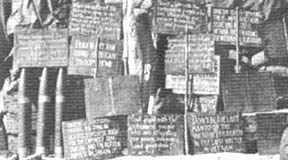 |
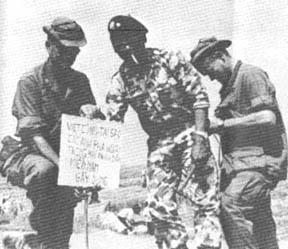 |
VC LEAVE BEHIND FRESH SIGNS - C Company, 3d Battalion, 22d Infantry found these signs with propaganda leaflets attached to them on Highway 22 in front of Fire Support Base Washington. |
Page 4-5 TROPIC LIGHTNING NEWS April 14, 1969
D’naughts, Bobcats, Warriors Do Their Thing
Photo Feature By Specialist 5 Doug Elliott
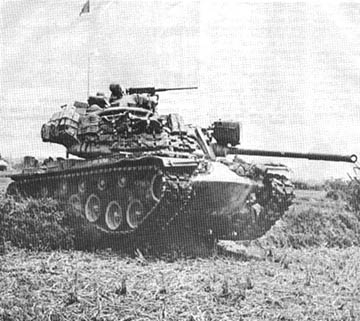 |
THUNDERING THROUGH – Tankers of the 2d Battalion, 34th Armor Dreadnaughts surge over a low rice paddy dike on their way to engage an enemy battalion located by a company of the 2d Battalion, 12th Infantry Warriors. |
|
CRUNCH – A Dreadnaught tank breaks through a tangled hedgerow to engage the enemy. |
 |
 When a company of the 2d Battalion, 12th
Infantry Warriors located an estimated North Vietnamese battalion, the enemy
were treated to a demonstration of the speed Lightning strikes.
When a company of the 2d Battalion, 12th
Infantry Warriors located an estimated North Vietnamese battalion, the enemy
were treated to a demonstration of the speed Lightning strikes.
Quickly vectored to the aid of the embattled company were elements
of the 2d Battalion, 34th Armor Dreadnaughts and the 1st Battalion (Mechanized),
5th Infantry Bobcats who were sweeping through the Boi Loi to the Ho Bo Woods
when the call came.
The Dreadnaughts broke through a massive hedgerow, charged across
the last mile of rice paddies like Sheridan to Shenandoah, and formed into line
while an air strike pounded the enemy positions.
With the Bobcat infantryman following, tanks and APCs charged into
the hedgerow fortress with guns blazing. One row was taken. Then the
tanks swung around the enemy flank, catching Charlie in a hot crossfire.
The enemy was dug into elaborate bunkers and emplacements, and
strong resistance sometimes kept gains to inches. But the Bobcats,
Warriors and Dreadnaughts, using small arms, mortars, grenades and the 90mm main
guns of the tanks, blasted the hostile bunkers one by one.
Contact was broken in the evening but the fight was renewed the
next morning and continued through that day. Total body count for the
rough two days work was 141 enemy soldiers.
Mute evidence to the sheer volume of the fire came to light when
one soldier policed up an AK-47 with a 3-inch piece of metal from a 90mm high
explosive round jammed down the barrel.
FORWARD – (Above, left) An infantryman of the 1st Battalion
(Mechanized), 5th Infantry moves toward the sound of guns on the smoke-shrouded
battle field.
| THUNDER – A Dreadnaught tank punches into the enemy position with its big gun. | 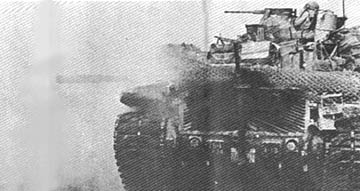 |
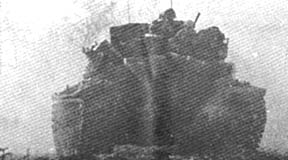 |
BAD NEWS – Out to outflank Charlie, a tank from the 2d Battalion, 34th Armor moves along a hedgerow. |
| BY INCHES – Under the firepower of the Dreadnaught’s 90mm guns, infantrymen move on the enemy’s position. | 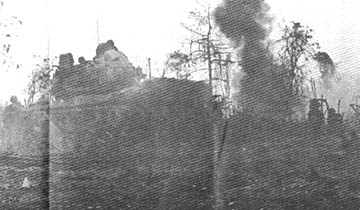 |
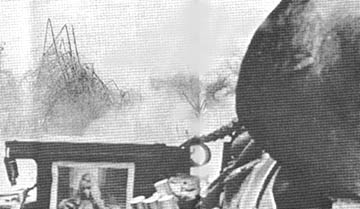 |
INSPIRATION – No Molly Pitcher she, but the picture of the young lady may have had something to do with the attitude that put a 90mm round on a target bunker in the hedgerow. |
| COVER FIRE – Firing the .50 caliber and 7.62 coax machine gun, a Dreadnaught tank commander keeps the enemy’s head down while Bobcat infantrymen advance. |  |
Page 6 TROPIC LIGHTNING NEWS April 14, 1969
| AMBUSHED – Only seconds after soldiers of the 2d Brigade were caught in an ambush in the Citadel area northwest of Cu Chi, they began to pour out defensive firepower while maneuvering into a superior offensive position. (PHOTO BY SGT JAN ANDERSON) | 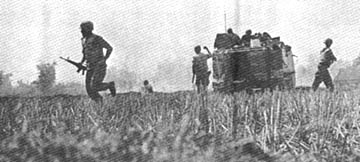 |
 |
NOT SO COMFORTABLE – This Tropic Lightning soldier shows a look of disgust as he slogs his way through one of the few remaining streams left during the dry season. Wait ‘til it starts raining again! (25th INF DIV PHOTO) |
Can’t Swing in the Sunshine
Without His Hard-Core Shades
By SGT Jan Anderson
CU CHI – When Specialist 4 Thomas N. Borders, a 2d Brigade
soldier, drove his armored personnel carrier within five feet of an enemy RPG
position, he thought his future looked a little bleak – especially when he
could look through his sights and see Charlie’s eye squinting for an accurate
shot.
Fortunate for Borders, who comes from Sidney, Ohio, he was sitting
on top of his APC using extended laterals to guide his vehicle. Just as
the VC soldier fired, Borders closed his eyes and the rocket hit right below
him, piercing the APC’s armor shell and sending shrapnel flying.
Borders was unhurt, but the concussion generated by the explosion
knocked off his sunglasses and sent them tumbling to the ground, near the
enemy’s position.
Borders and his sunglasses are an inseparable team, as anyone in
his platoon will verify.
He immediately jumped from the track not only to seek cover, but to
plan a method of retrieving his sunglasses as well.
Borders concluded that the same Viet Cong who fired the RPG had
also “stolen” his sunglasses when they fell to the ground.
As Borders peered around his track, which was his shield, he saw
the suspect facing the other direction ready to squeeze off another RPG round at
the flank APC.
Borders also saw his sunglasses lying near the spider hole.
Quickly he sprinted near enough to pick up his shades, tossed a grenade into the
hole and ran for cover.
“When the VC turned around and saw me just before the grenade
went off, his hair stood straight up,” Borders said later. “I
guess he thought the first RPG had gotten me.”
Borders later learned that four VC bodies were found in the hole.
The incident netted the Fire Brigade soldier a three day pass, a four body
count, a tale to tell and one pair of combat-hardened sunglasses.
New Type Grade Level Comes Into Cu Chi High
CU CHI - The Civil Affairs Section, Division Headquarters arranged
for the use of a division grader last week to clean the area around Cu Chi High
School in preparation for a playground to be constructed there later this
spring.
The area, which has been the site for the building of three new
schools recently, was covered with the rubble of heavy construction.
Working with Major Stan Curbow, Senior District Advisor, and Major Juan Benitez,
Division Transportation Officer, Captain William Menzel of the DISCON S-5
section arranged to bring the busy grader to the school on Sunday afternoon.
With a Vietnamese boy riding “shotgun,” a Tropic Lightning
engineer cleared the area to a level plain, paving the way for the next project
- the construction of swings, seesaws, and other playground items.
First Lieutenant Trung Luat, a Cu Chi District staff officer
representing the village chief, explained that in the past the rubble around the
school had made it difficult for the children to play safely.
“We discovered that the only area they had was in the middle of
the construction zone, not a safe area at all,” said Luat. “Now that
the land has been cleared we hope to provide them with a real recreation
area.”
Lancers In Jungle Fight, Doom 4 VC
TAY NINH - Deep in the jungle of the Crescent area nine miles
northeast of Tay Ninh City, elements of the 1st Brigade fought a fierce battle
with an unknown size enemy force.
After placing their armored personnel carriers in night laager
position, the Tropic Lightning soldiers spread out to search the tangled
overgrowth. While moving through the jungle, they received small arms fire
from an enemy trench line. In the ensuing fire fight the Lancer Brigade
troopers killed four enemy.
“This was some of the thickest jungle we’ve been in. It
was a hard and brief fight but we tore them up good. We suffered only two
minor casualties,” said Specialist 4 James Paet of Honolulu, Hawaii.
Page 7 TROPIC LIGHTNING NEWS April 14, 1969
Merit Commendation To Third Bde Unit
DAU TIENG - Cannoneers of 1st Battalion, 27th Artillery were
awarded the Meritorious Unit Commendation recently in a ceremony held at the
Brigade base camp.
The ceremony also marked the firing of the battalion’s half
millionth round since entering the Vietnam war.
Colonel Harold G. DeArment, commander of the 23d Artillery Group,
presented the Meritorious Unit Citation to 1/27th‘s battalion commander,
Lieutenant Colonel Joseph J. Skaff.
The battalion was cited for its support of military operations from
September 11, 1967 to July 31, 1968. “Displaying exceptional versatility
and unflagging determination, the men of the unit supplied consistently superb
artillery support to four United States Army divisions and two Army of the
Republic of Vietnam divisions,” the citation read.
In addition to being cited for its combat operations, the battalion
received recognition for its medical assistance programs, high school
scholarships and construction projects in nearby Vietnamese villages.
DeArment said that through the battalion’s valiant performance of
duty and selfless determination, the unit’s members contributed immeasurably
to the Free World’s struggle against communism in the Republic of Vietnam.
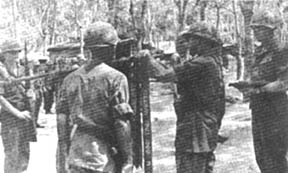 |
COLONEL HAROLD G. DEARMENT, commander of the 23rd Artillery Group (center) attaches a Meritorious Unit Commendation streamer to 1st Battalion, 27th Artillery’s guidon. Lieutenant Colonel Joseph J. Skaff, (left) accepted the award in behalf of the the battalion, and Sergeant Major Richard T. Flynn, the battalon sergeant major, assisted in the ceremony. (PHOTO BY SP4 LARRY HAMILTON) |
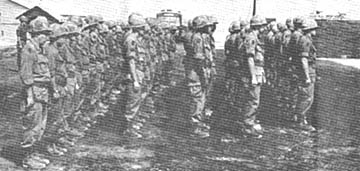 |
LARGEST CEREMONY - Eighty six members of Bravo Troop, 3d Squadron, 4th Cavalry form up during the largest company-sized ceremony ever held by the Division. Awards including the Silver Star were presented by the Cav’s commanding officer, Lieutenant Colonel Robert S. MacGowan. See story below. (PHOTO BY SP4 HAROLD ANDERSON) |
CU CHI - The largest awards ceremony ever given to a company-sized
unit in the history of the Division was held for Bravo Troop 3d Squadron, 4th
Cavalry recently at Cu Chi base camp. Making the presentations was
Lieutenant Colonel Robert S. McGowan, commanding officer of the 3/4 Cavalry.
Out of an authorized total strength of 192 troopers; 86 members of
Bravo Troop were awarded 133 awards, including 10 Silver Stars.
All but 12 of the awards were for actions which occurred since Jan.
1,1969. The others were for December, 1968.
Sergeant First Class Robert H. Maxey of Salina, Kan., was awarded
three Silver Stars and his second purple heart. The Silver Stars were for
heroic actions on Jan. 4, 6, and 26.
Sergeant Jay V. Aliffe of Savannah, Ga., won two Silver Stars for
actions on Jan. 16 and 26. He was also awarded three Bronze stars for
valor and an Army commendation medal for valor.
Specialist 4 Fernando Herrera of San Antonio, Tex., and Specialist
4 David Goss of Wetherford Tex., each won a Silver Star, two bronze stars for
valor, and an Army commendation medal for valor.
Sergeant Stephen F. Baily of Marrietta, S.C., was awarded a Silver
Star and two bronze stars for valor, and Specialist 4 Charles Blackman of
Ressemen, Ala., won a Silver Star and a bronze star for valor.
Sergeant Dennis Roe of Metamora, Mich., was awarded his second
Silver Star.
During the first two months of 1989, Bravo Troop accomplished a
record in confiscating 125,000 pounds of enemy rice, 15,400 pounds of salt and
1,200 pairs of plastic sandals found in NVA caches. The Horsemen also
killed 92 North Vietnamese soldiers.
‘Moonlighter’s Build Hootches
CU CHI - The 2d Battalion, 12th Infantry motor pool’s main
function is to “keep ‘em rollin’.” In this they do an admirable
job. But when the work day comes to an end at the motor pool they continue
to work.
During the past month the Lightning mechanics have been busy
building new living quarters, multi-purpose grease rack and improving their area
in general.
The most outstanding project is an attractive, strong and
comfortable home for the enlisted men. “The new quarters are a vast
improvement over the places the men previously used,” stated Staff Sergeant
Gary Neff, Tacoma, Wash.
“My old hootch leaked and was often visited by mosquitoes, ants
and even a snake once,” related Specialist 4 Gene Snyder, Adah, Pa., “we had
to have an improvement.”
The first step was to design a structure for the needs of the men.
Staff Sergeant William Santos, Puerto Rico, determined what the housing should
consist of and made a blueprint for the structure.
Following the design of the building came the problem of materials.
This was solved by Company D, 554th Engineers through a self-help program.
They provided virtually all the lumber, roofing, screen doors and screen wire.
“Construction began and continued to completion with everyone
working as a team,” said Specialist 4 Lamar Merritt, Atlanta, Ga.
The new enlisted man’s hootch - or house - is 21 feet by 36 feet
with eight-foot ceilings. Each man has his own room. The walls are
of sheet plywood. The floor is solid wood with no cracks. Screens
cover every window and door.
“The screened-in porch adds a homey atmosphere,” according to
Specialist 5 Paul Laughton of Brainer, Minn.
Specialist 4 James Powell of Kent, Ohio, sums up the new structure
as an attractive, comfortable insect free, classy hootch.
The Fire Brigade carpenters are not finished yet, though.
Plans for a patio, day room, senior mechanics hootch and wash pit have been
initiated.
“We may not get the full benefit of our labors but some GI will
and the work sure helps the time go by faster,” said Santos, organizer of the
project.
Cong Taste Armor Sting
CU CHI - The surprise of an ambush and the rumble of Company A, 2d
Battalion, 34th Armor, tanks let Charlie know the air around the 2d Brigade is
not healthy for him any longer.
The armor and infantry at the ARVN night laager was commanded by
Captain Richard E. Lovisone, West Hartford, Conn., who set up an ambush site
surrounding the position.
Around 8:30 p.m. the Tropic Lightning soldiers made contact with an
estimated enemy platoon. Tanks were brought on line to fire on suspected routes of
escape.
An immediate search of the area revealed one enemy dead. The
following morning another VC body was found along with one VC medical bag and
documents.
Ambition Gets SP4 Some Rank
Takes One Week To Make E-6
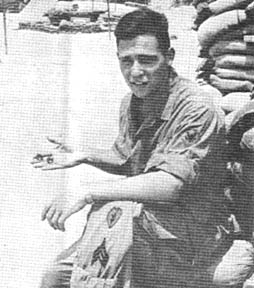 TAY NINH - In a series of events that struck with Tropic lightning
speed, Joseph P. Kern of the 1st Brigade became a staff sergeant without ever
knowing that he had made sergeant.
TAY NINH - In a series of events that struck with Tropic lightning
speed, Joseph P. Kern of the 1st Brigade became a staff sergeant without ever
knowing that he had made sergeant.
Kern, a mortarman, was a Specialist 4 when he left Tay Ninh to go
to the Lightning Combat Leadership Course at Cu Chi.
While he was gone, orders promoting him to sergeant came through to
his unit’s headquarters, and Kern earned himself another boost in rank by
finishing on top of his LCLC class after the ten rigorous days of the course.
“I never even knew I’d made sergeant,” Kern said later.
His platoon leader, Platoon Sergeant Steve L. Meredith of Ft.
Meade, Md., was just as surprised.
“That’s the first time I’ve ever seen anyone go from being a
gunner with a mortar squad to a platoon sergeant in a week,” Meredith said.
Meredith’s naming of Kern as his platoon sergeant, however,
showed he didn’t believe the promotions were unjustified.
FORMER SPECIALIST FOUR Joseph P. Kern (above,
right) went from that rank
to sergeant E-6 in a couple of days, and never had a chance to be a sergeant
E-5. A regular promotion was followed by a special one for excellence in
the LCLC course. (PHOTO BY PFC RALPH NOVAK)
Page 8 TROPIC LIGHTNING NEWS April 14, 1969
3/4 Cav Wallops Ambush
CU CHI - During a search-and-clear mission in a dense jungle
portion of the Boi Loi Woods six miles north-northwest of Cu Chi, elements of
the 3d squadron, 4th cavalry pitched into an unknown number of enemy soldiers.
The cavalrymen were making their sweep through bamboo thickets
during the early part of the afternoon. It was a sweltering day and the
troopers were watching for any sign of movement as they pushed their way through
the wilderness.
“Something seemed fishy,” said one trooper in the 3d Platoon.
“Our dismounts were on the ground making a check of the area when a smoke
grenade went off to our rear. I knew that someone was watching us.
We learned later that it was a scout’s warning to the NVA unit that an armored
unit was approaching their position.
First Lieutenant Gary W. Carlson of Peekskill, N.Y., recalls,
“The enemy was well concealed in the heavy brush which allowed him to throw
the first punch. It didn’t take long before we had his positions
pinpointed, though. His defenses were set in long, wide trench lines with
bamboo as cover.”
The vehicles proceeded deeper into the underbrush until they came
to a clearing.
Then two rocket-propelled grenades slammed into the cavalry’s
armor from hidden NVA positions. Small arms and automatic weapons fire
whizzed past the troopers as they swung their machineguns and 152mm Sheridan
main guns around at the enemy.
Helicopter gunships were called in along with a heavy barrage of
Tropic Lightning artillery which battered the enemy bunkers. The troopers
then positioned themselves on line and assaulted the enemy trenches.
“It took us nearly four hours to rout the enemy from his
bunkers,” said Sergeant Michael H. McClain of Sandy Point, Okla., a tank
commander in the 3d Platoon. “As we came upon their bunkers, our
dismounted troopers tossed hand grenades into each of the gunports.”
A complete search of the bunkers and trenches revealed 19 NVA
killed and one detained. An RPG with ammunition was also found.
Hoi Chanh ‘Recruits’ 5
DAU TIENG - “If ya can’t beat ‘em, join ‘em.”
This may not be a word for word translation of the message a Kit
Carson Scout gave local Viet Cong guerrillas in Michelin rubber plantation near
Dau Tieng, but whatever he said it was enough to get five of the guerrillas and
two Vietnamese laborers to change sides.
Regardless of the motives behind their surrender, the enemy
soldiers are now an integral part of the 25th Infantry Division’s
participation in the Government of Vietnam’s Chieu Hoi Program - a program
designed to let former enemies of the government prove their allegiance by
aiding the Allied war effort.
The Kit Carson Scout who talked them into surrendering was home on
leave for the Tet holidays. He is a former Viet Cong soldier himself,
which points out exactly what the Chieu Hoi Program is all about according to
Major Anthony J. Gallo of Rutland, Vt., the division’s 3d Brigade intelligence
officer.
“In many cases, Kit Carson Scouts continue and reestablish ties
with cohorts in the field and by this means can encourage them back to
Vietnamese government control,” he said. “Every Hoi Chanh we get is
another means of helping pacify local guerrillas.”
So what’s in store for the seven Hoi Chanhs received at Dau
Tieng?
“We plan to have them make tape recordings, encouraging their
former allies to surrender,” said First Lieutenant Kevin M. Walters, the 3rd
Brigade’s psychological operations officer.
“We will also have them write messages describing their good
treatment in our hands, to be dropped in the form of leaflets.”
Whatever the official ramifications of the Chieu Hoi Program may
be, unofficially it is certainly one of mutual benefits.
The seven ralliers received at Dau Tieng are now enjoying the
fruits of the democratic process, and the Allied cause is benefiting from their
knowledge of Viet Cong tactics and their willingness to persuade their friends
to switch instead of fight.
Action Casualties Treated, Evacuated Within Minutes
TAY NINH—Bullets whizzed everywhere; a brief but savage fire
fight had just erupted. A Tropic Lightning soldier from the 1st Brigade
falls with an AK-47 slug in his leg.
The wheels of modern warfare medical procedure immediately start to
roll.
A fellow trooper crawls through the devastating fire and carries
his buddy out of the kill zone. Then a combat medic goes to work.
A quick, effective patch-up job and the wounded man is on his way
out of the dense jungle to a secure area where the medical armored personnel
carrier, commonly called the ‘band aid wagon,’ is waiting.
Soon a helicopter dustoff ship arrives and the temporarily
sidetracked soldier is whisked away to modern medical facilities in Tay Ninh
base camp.
The entire rescue takes less than five minutes.
| DUST OFF - A medevac chopper lifts off with the wounded men to speed him the medical attention at the 45th Surgical Hospital in Tay Ninh. The dustoff is the final step in getting the wounded man to a doctor’s attention. (PHOTO BY SGT ROGER WELT) | 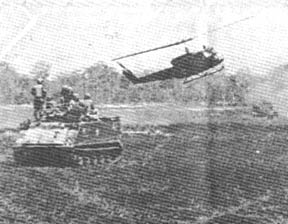 |
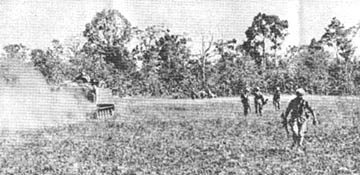 |
AID - The band aid wagon, otherwise known as a medic track, speeds to the scene of a wounded soldier deep in the Crescent area northeast of Tay Ninh City. (PHOTO BY SGT ROGER WELT) |
Thanks to
Mack D. Gooding, 15th PID, 1st Bde., for sharing this issue,
Kirk Ramsey, 2nd Bn., 14th Inf. for creating this page.
This page last modified 8-12-2004
©2004 25th Infantry Division Association. All rights reserved.